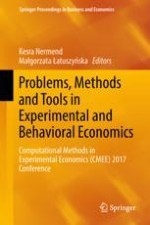2018 | OriginalPaper | Chapter
22. Cognitive Reflection Test in Predicting Rational Behavior in the Dictator Game
Authors : Monika Czerwonka, Aleksandra Staniszewska, Krzysztof Kompa
Published in: Problems, Methods and Tools in Experimental and Behavioral Economics
Publisher: Springer International Publishing
Activate our intelligent search to find suitable subject content or patents.
Select sections of text to find matching patents with Artificial Intelligence. powered by
Select sections of text to find additional relevant content using AI-assisted search. powered by
